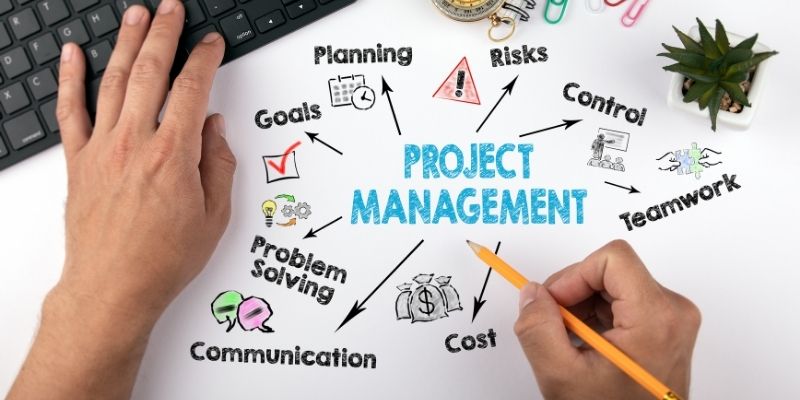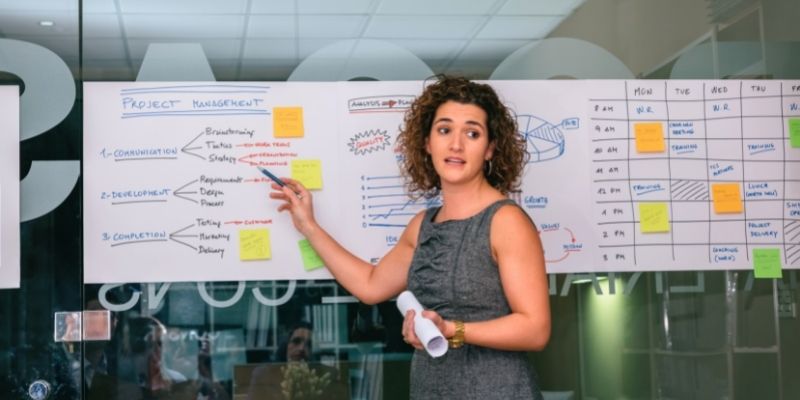
Project Managers are skilled multi-taskers who dedicate their professional lives to overseeing the running and delivery of business and organisational projects. They work with all manner of trained personnel in their industry to bring together the collective capabilities that will take a new product, service, or process from concept to reality.
As such, time and money are generally the key focus of Project Managers. They need to deliver projects on time and under budget, in addition to making sure it fulfils the objective. However, studies have shown that almost 50% of projects in businesses run behind schedule, over budget or both.
This is why effective Project Managers are in such high demand across the business realm. Those who can bring the schedule and budget back in line while delivering high quality results are the Project Managers who will quickly rise above the rest.
To develop this skillset, you need to take a step back and start looking at projects objectively, to identify and eliminate problem areas that run them off course. What you need is to adopt the lean methodology.
What is the Lean Methodology?
The lean methodology, or lean management as it is otherwise known, is a philosophy thought up by Toyota to maximise value while minimising waste during their manufacturing process. They did so by looking at three things: 1. Muda – Waste, 2. Muri – Overburden, 3. Mura – Unevenness, otherwise known as the 3M, and eliminating any unnecessary waste that was identified.
This, therefore, made their manufacturing process lean, as it used the least resources required to get the maximum value for their customers.
How Lean is Applied to Project Management
Lean management has since been applied to many facets of business outside of manufacturing. Governments, construction enterprises and even healthcare departments all look at ways to ‘trim the fat’ as it were in their operation, and project management is no different.
Project management benefits from the lean management principles so much, that it is now officially combined and known as ‘Lean Project Management’. This combination of processes strives to maximise value and minimise waste by assessing and refining every aspect of the project process.
It does so by drawing on five core principles of lean thinking:
- Value – Determine value in the eyes of the customer
- Value stream – Map out the entire project process and identify areas of waste
- Flow – Create an improved plan with the waste removed
- Pull – Operate on a pull-based system – only provide products when the need is there
- Perfection – Learn from past events to create a lean culture
In particular, the value stream concept is crucial for lean project management, as it identifies the sequence of activities involved in delivering a project with an agreed value. By creating a value stream map, you can better understand how value and waste are created during the project lifecycle, and then work to optimise it.
By adopting lean project management principles, Project Managers can:
- Improve final product quality
- Complete on time and reduce that completion time
- Complete on budget
- Eliminate waste
- Reduce costs
- Add value
Overall, the lean management methodology aims to shift organisational thinking so that they optimise their purpose (provide customers with greater value), processes (maximise workflow productivity) and people (encourage the workforce to engage in continual improvement).

The Main Focus of Lean
Eliminating waste is the main priority of lean management, but unlike manufacturing, it’s not always so easy to visualise waste in project management. In manufacturing, you would see the waste in terms of the unused resources, unnecessary effort, wasted materials or by-products.
However, the waste in project management and other business processes that don’t involve a physical end-product stretches far beyond physical waste. It is typically classed as anything that doesn’t add customer value.
The lean management methodology has identified seven types of waste
- Overproduction – Excess
- Waiting – Lost time
- Transportation – Inefficiencies
- Over-processing – Unnecessary work
- Inventory – Left-over products
- Motion – Number of steps
- Defects – Issues with quality
Those who study the Lean Six Sigma methodology will also learn about an eighth waste: the underutilisation of skills or brainpower. This is typically in reference to not tapping into an employee’s full potential, such as when companies hire someone who is overqualified.
Study Lean Six Sigma with Stonebridge!
Project Managers who can eliminate waste and create wealth for the business they work in will go far in their career. Employers naturally want the skills of professionals who can deliver exceptional results, without unnecessary expense. So, if you take the time to learn these skills, you too will be in high demand.
The best way to gain these skills is by studying the project management lean process. Certified courses are available in this area, provided by Lean Six Sigma. There are many excellent benefits to completing these courses, besides studying lean project management in detail.
Anyone from a novice or aspiring project management professional to one that has been in the industry for years can advance their skills and career. This is because Lean Six Sigma courses operate on progressive levels, and the best thing is, you can study them all from home.

With Stonebridge Associated Colleges, you can complete:
Lean Six Sigma Yellow Belt Training Course
This is where you will begin if you are just starting out with the lean management methodology. You will explore business-focused modules that focus on methods of implementing significant improvements in business. You will also learn the value of boosting the morale of the project management team as well as different tactics to enhance customer loyalty.
Lean Six Sigma Green Belt ISO 18404 Training Course
The green belt is the next stage in the Lean Six Sigma training, where you will dive into advanced lean project management techniques such as the DMAIC Cycle (Define Phase, Measure Phase, Analyse Phase, Improve Phase and Control Phase), Lean and Risk Management, as well as SPC Tools and Techniques. This knowledge will allow you to take on project management roles with more responsibility.
Lean Six Sigma Black Belt ISO 18404 Training Course
The most advanced Lean Six Sigma course offered with Stonebridge is the black belt training course. This will help you progress to the top of the ladder in your career by taking a detailed look at how you can standardise work, enhance customer satisfaction, reduce waste and defects, as well as increase business profits.
Enrol Now
By choosing to study Lean Six Sigma project management courses online, you can develop the lean management mindset and the skills that will progress your career from home. There are no classes to attend, and all exams are included as part of the course package. As such, you will have everything you need as soon as you enrol.
Stonebridge Associated Colleges is a leading UK distance learning provider. Our online courses are not only convenient, they also come with the additional benefit of professional tutor support and flexible payment methods to spread the cost of your learning.
Find out more about how you can get the lean project management skills employers are looking for now by speaking with our Course Executives. Call them now on 0121 392 8288, visit our support centre online or click the link to view the courses in more detail below.






Leave a Reply